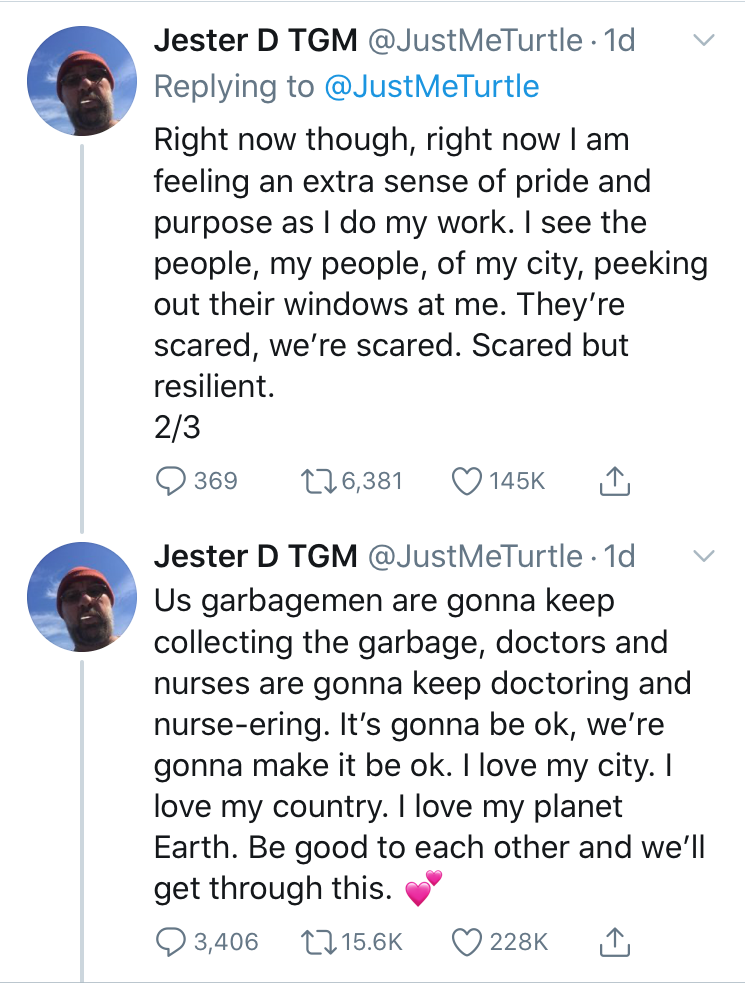From the Rabbi's Bunker
Homebound Israelis singing on their balconies
(a practice originated in Italy),
a familiar and very appropriate song:
B'Shana Ha'ba'ah
"Next year we'll sit on our porches
counting the migrating birds.
https://lyricstranslate.com
Kids on a holiday will play Tag
Between the house and the fields
You will see, you will see
How good it will be
Next, next year"
Thanks to Irma Ross for sharing this one...

No Large Gatherings? What About Bar Mitzvahs?
Monday, March 16
This morning I wrote to our 2020 B'nai Mitzvah families, including the adult b'nai mitzvah class. With state regulations now restricting gatherings to groups of less than 50, what was abstract and theoretical has suddenly become all-too-real. The eight week time frame recommended by the CDC takes through the first bar mitzvahs of the season us right up to our adult b'nai mitzvah, scheduled for May 16.
If the current restrictions hold, we will soon be faced with a decision as to whether to postpone B'nai Mitzvah services or scale them down significantly. The possibility of streaming video does exist - but for those with Sabbath observant relatives it may not be ideal.
If we choose to postpone, which is the most likely scenario, the first question people will ask is whether all that study of a particular Torah portion or haftarah will be for naught. Let me offer a rabbinic ruling that could decrease at least that concern.
For bar and bat mitzvahs postponed during this crisis, I will allow the student(s) to read from the portion they have prepared, at whatever Shabbat the service is rescheduled for.
So, for example, if the student has prepared a reading from the portion Behar, and the service is rescheduled for the week when we read the portion Re'eh, we will take out two Torahs and read selections from both portions. The haftarah will be the one that the student has learned - plus perhaps a verse or two from the actual haftarah for that day.
This ruling will stay in effect only for the duration of the coronavirus crisis.
I hope this very unusual - but necessary - response at leasts puts some concerns to rest. With all the anxiety that this disease provokes, at least we can try to lessen the strain on families of B'nai Mitzvah. So, students and adults can continue to prepare with Cantor Bear and Judy Aronin, and at least one thing in life can remain stable and constant.
I know that for the kids there must be lots of disappointment in the possibility of postponing their big day (though no doubt for some a little relief as well), but it will enable us to see their celebration as a way of marking our emergence from this coronavirus ordeal every bit as much as it marks the emergence of a child into adulthood. These postponed post-coronavirus B'nai Mitzvah will be among the most joyous we'll ever share!
Social Distancing: the Mitzvah

Considering not social distancing? Read these ten profiles from Buzzfeed of people you are endangering with your callousness, people with compromised immune systems and other risk factors. It's just the opposite of the kind of love we are seeing shared all over the world right now - love for people we have never met, yet now we feel that our lives are inexorably intertwined. See this incredible Twitter thread that brought me to tears.


All over the world, we share the same destiny, the same fears, and the same desire to love our neighbor as ourselves...

Reb Nachman's Ten Healing Psalms
Before our hands can fix, we need to care. Before we can care, we need to become aware. But how can we remind ourselves to perceive and sustain our sensitivity and capability for compassion? We can shy from the pain that comes with empathy, and we can shy from the pain that comes with taking responsibility for the suffering we cause. But there are consequences to shying away, to disaffection and callous disassociation. If there is any hope, it is as Rebbe Naḥman explained so succinctly: "If you believe that you can damage, then believe that you can fix."
The Psalms or Tehillim in Hebrew, are the core of Jewish liturgy; its poetry believed to be a treasury of the Power to heal. Power to bring about intervention, if only in our own awareness. If every one of us is like a lonely world unto ourselves, then perhaps some shared songs can unite us, and reconnect us to the world we share together: healing it, liberating it, redeeming it with renewed compassion. This is the hope and promise of a devotional practice of reciting lyrics to songs with long lost and ever rediscovered melodies. Melodies which we can only discover through our own private readings of these ancient songs.
According to Pesaḥim 117a [2] there are ten kinds of songs in the Tehillim: Ashrei, Beracha, Maskil, Nitzuach, Shir, Niggun, Mizmor, Tefilla, Hoda'ah, and Halleluyah. In the early 19th century, Rebbe Naḥman, a great-grandson of the Baal Shem Tov, taught that the recitation of ten psalms, each representing one of these categories, could act as a Tikkun (remedy).[3] Their recitation would help in a process of t'shuva leading to an awareness of the divine presence that permeates and enlivens this world.
On April 1810, Rebbe Naḥman revealed the specific ten psalms of this Tikkun to two of his closest disciples, Rabbi Aharon of Bratslav and Rabbi Naftali of Nemirov.
--------------------
I'm planning to do study sessions revolving around these ten Psalms. Times to be announced. A great resource for this study is the book Healing of Soul, Healing of Body, by Rabbi Simkha Weintraub, which can be ordered on Amazon. He looks at each of these psalms through the eyes of contemporary teachers. Together, we can find comfort and inspiration in this study.
Stay safe
Rabbi Joshua Hammerman

No comments:
Post a Comment